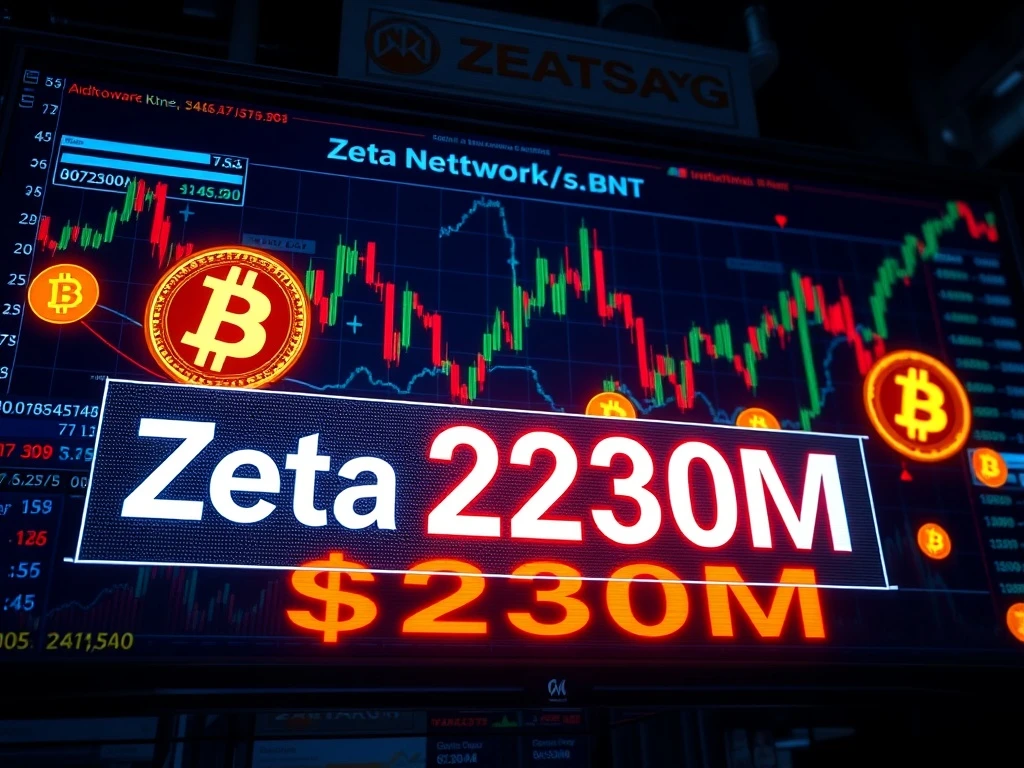Bitcoin Powers Zeta Network’s Revolutionary $230M Private Sale Success

The cryptocurrency world buzzes with significant news. Nasdaq-listed Zeta Network just completed a private sale, raising an impressive $230 million. This groundbreaking deal was backed by Bitcoin and SolvBTC. It marks a pivotal moment for institutional crypto adoption. This development signals a strong future for digital assets in corporate finance.
Zeta Network’s Landmark $230M Private Sale
Zeta Network, a prominent digital infrastructure and fintech firm, announced a substantial capital raise. The company secured approximately $230.8 million through a private share sale. Investors showed strong confidence in the venture. They paid using either Bitcoin (BTC) or SolvBTC. SolvBTC is a wrapped Bitcoin-backed token from Solv Protocol. This innovative approach allowed the company to integrate crypto assets directly into its corporate treasury.
Under the terms of the deal, investors will receive newly issued Class A ordinary shares. Furthermore, they will get warrants. These warrants allow them to purchase additional shares later. The exercise price for these warrants is set at $2.55 each. Each share and warrant pair sold for a combined price of $1.70. This structure provides future upside potential for participants. Zeta Network expects the deal to finalize soon, pending closing requirements.
Strengthening the Crypto Treasury with Bitcoin Assets
Zeta Network explicitly stated its intention to strengthen its balance sheet. This strategic move involves integrating Bitcoin-based assets. It forms a key part of their broader treasury strategy. Patrick Ngan, Zeta Network’s chief investment officer, highlighted this benefit. He noted that integrating SolvBTC enhances financial resilience. It combines Bitcoin’s scarcity with the potential for sustainable yield.
This strategy reflects a growing trend among forward-thinking companies. They are increasingly recognizing the value of digital assets. Building a robust crypto treasury offers diversification. It also provides exposure to a rapidly evolving financial landscape. Zeta Network is developing an institutional Bitcoin platform. Therefore, this move aligns perfectly with its core business objectives. It showcases a commitment to the future of decentralized finance.
Understanding Solv Protocol and SolvBTC
Solv Protocol operates as an onchain Bitcoin asset management platform. It plays a crucial role in this private sale. The protocol issues SolvBTC. This token is a 1:1 wrapped Bitcoin-backed asset. SolvBTC is specifically designed for institutional use. It facilitates various yield and liquidity strategies within the decentralized finance (DeFi) ecosystem.
Ryan Chow, CEO of Solv Protocol, commented on this development. He stated that listed entities are redefining productive Bitcoin holdings. This indicates a shift in how traditional finance views crypto. It moves beyond simple speculation. Instead, it focuses on utility and strategic integration. Solv Protocol helps bridge the gap between traditional and digital finance.
The Rise of Institutional Bitcoin Yield Strategies
While Bitcoin remains a primary asset for digital asset treasuries (DATs), the landscape is evolving. Michael Saylor popularized the DAT strategy in 2020. Now, companies seek to put their Bitcoin to work more actively. This has led to the emergence of various Bitcoin yield strategies. Some debate whether proof-of-stake networks like Ethereum (ETH) or Solana (SOL) offer better long-term returns. However, Bitcoin-focused yield products are gaining traction.
Major financial players are entering this space. For example, BlackRock, the world’s largest asset manager, filed to register a Delaware trust company. This filing was for a Bitcoin Premium Income ETF. Bloomberg ETF analyst Eric Balchunas explained its mechanism. The proposed fund would generate yield by writing covered call options on Bitcoin futures. It would then collect the option premiums. This innovative approach demonstrates growing sophistication.
Expanding Bitcoin Yield Opportunities
Coinbase also launched a Bitcoin Yield Fund in May. This fund targets institutional investors outside the US. It provides exposure to yield on BTC holdings. The fund aims for an annual net return of 4% to 8% for its holders. These initiatives highlight a clear demand for productive Bitcoin assets. They allow institutions to earn returns on their substantial BTC holdings.
Speaking at the Token2049 event, Ryan Chow envisioned a future where Bitcoin could be staked. This staking would secure various networks. He predicts thousands of Bitcoin will eventually enter proof-of-stake ecosystems like Solana. This future integration would unlock new utility for Bitcoin. It transforms it from a store of value to an active participant in network security and yield generation. The private sale by Zeta Network is a strong indicator of this forward momentum.
Pioneering Institutional Bitcoin Adoption
The Zeta Network transaction is more than just a capital raise. It represents a significant step forward for institutional Bitcoin adoption. A Nasdaq-listed company directly accepting Bitcoin for shares sets a powerful precedent. This action validates Bitcoin as a legitimate and desirable corporate treasury asset. It also underscores the growing maturity of the digital asset market.
Companies are moving beyond simply holding Bitcoin. They are actively integrating it into their financial strategies. This includes using it for capital raises and generating yield. The institutional embrace of Bitcoin continues to accelerate. This trend is driven by innovation from companies like Zeta Network and Solv Protocol. Ultimately, it solidifies Bitcoin’s position within the global financial system. The future looks promising for Bitcoin’s expanded role.










